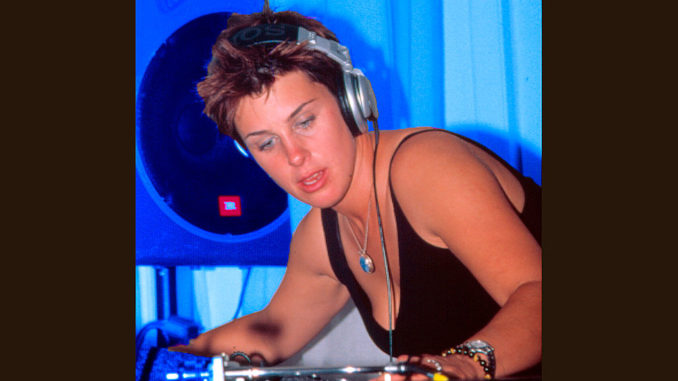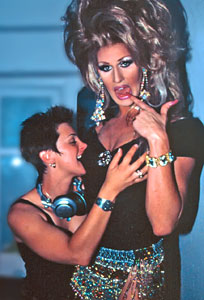
If you’ve heard any of Madonna’s songs, chances are you’re familiar with the work of DJ Tracy Young. Originally from Washington, D.C., Tracy recently remixed three songs from Madonna’s Music album, including the eponymous single “music,” “don’t Tell Me,” and “What It Feels Like for a Girl,” and now spins both locally and internationally.
Over cigarettes and Diet Cokes at Segafredo, the most famous female DJ of the moment talks about her life, her musical influences and, well, what it feels like for a girl.
What was it like playing Madonna’s wedding?
(laughs) Everybody danced. It was a great party and an honor to do it, but um, I don’t know, I kind of feel like I shouldn’t talk about it. If Madonna wanted to talk about it, then she should be the one to talk about it, you know what I mean?
OK, you don’t have to tell me who was there or anything, but just in terms of how it felt to play?
It was an honor. I mean, the energy was incredible and everybody was in a good mood and everybody had a good time. It was quite an honor to do it, I mean, out of all the DJs in the world, she chose me. But it was definitely one of those things you’ll never forget, you know, so…
How did you learn to mix?
Self-taught. With the influence of my ex-boyfriend, who was a DJ. When I would go visit him, I would just play on his turntables and practice, and he was like, ?You have a natural talent for this, you should do it,? and I was like, ?Come on, Kenny, there’s no females doing this.? He really supported it, and when we broke up I kind of forgot about it, but it was always in the back of my head. When I started dating this other guy, it was all I was talking about, and he went out and bought me the whole turntable system and everything and that was it. I just locked myself in a room and from what I learned from Kenny, just the simple things, I just practiced and practiced and practiced, and then I got a club in D.C.
That’s sort of similar to Madonna’s story, right?
Um, yeah, and it’s funny you brought that up, because she was always kind of my inspiration that way. I always admired that she had a dream and just went for it, so in the back of my head, when a door would close, I’d be like, ?Well, if Madonna can do this I can.? So I always admired her, and to work with her now is an honor

You’ve said in other interviews that it’s really sort of difficult to be a woman DJ.
Not so much now, but it was, especially ten years ago when nobody was doing it. I mean it’s a male-dominated business, but there were a few women club owners that I knew and they gave me the shot, but most of the men were like, ?You don’t know how to DJ; you can’t mix.? I got that a lot, and then I realized that it wasn’t happening in the clubs, so I went to a radio station, WDGC in D.C., and they saw it as a novelty. They were like, “That’d be cool, a woman DJing on the radio,” so that’s kind of how it took off. I did the morning show with Donny Simpson, and he helped me a lot in D.C., and I started getting a lot of club jobs through the radio, which is backwards; usually you get radio jobs from being in the clubs! They were like, “We want Tracy,” because I was popular on the radio. And then I met Ingrid around the same time, and she was opening Liquid, and, the female supporting the female, she was like “I want to fly you down.” So I started playing in Miami and then other people were like, “Wow, you’re playing in Miami,” so one thing just led to another.
How did you meet Ingrid Casares?
Oh my god, seven years ago. I became really close friends with her sister, who lived in D.C. I went to University of Maryland and Ingrid actually went there too, so it’s kind of weird, but I went to New York one weekend and her sister introduced me to Ingrid. I didn’t really know who she was, and she’s talking about Madonna and K. D. Lang, and I’m like, “Are you talking about the Madonna,” you know? It was kind of a surprise. We hit it off, and we had a lot in common. She’s an awesome girl and she’s done a lot for my career. Tons.
Do you date other DJs now?
I have tried to date people in the music business, and it’s just too much competition. And I’m not competing with anybody, really, I’m just trying to do what I love, so people kind of compete with me because I’m a workaholic. I’m single!
You said you played for a lot of lesbian clubs in the beginning?
I’m bisexual. I don’t usually like to label myself but, if I have to, I consider myself that. Yeah, I started in the girl-clubs. And I got pigeonholed. That’s what I mean, the females kind of supported me in what I was doing more than the men. Even though I was dating women at the time, I couldn’t get a job at a gay man’s club. Nowhere. Even before the Madonna record came out, I couldn’t work at Salvation. I did a couple of nights, but it was impossible. I’ve always played for straight clubs, which I love to, you know, they’re really open to the music and stuff down here so it was always rewarding but, as far as the gay male population, they didn’t support me until Madonna. Which is an interesting thing, you know. That’s how it is. But now I play for everybody and I like it that way cause it keeps me in touch with what people want to hear and I get more of a well-rounded idea of what’s going on.
What about you? Are you gay or bisexual or straight?
I’m straight.
Oh, really? I’m sorry (both laugh). Well, my brother was here, he’s a straight guy and he was always looking for… not a connection with a person… but a connection to somebody like him.
Did he find that?
No, he moved! He said it was hard to meet a girl here, and I don’t know—it’s hard to meet anybody, I think. I mean it’s easy to meet people, but it’s hard to connect.
I hated Miami at first. I mean, I liked the weather, but I found it really hard to connect with people. It’s a different mentality here. Up north, it’s like, if they don’t like you, they don’t like you, you know what I mean? You know. And here you never know where people are coming from.
What do your parents think of what you do? Do they get it?
My mom does; she’s like a product of the 60s, very spiritual, almost too spiritual, where she’s not realistic, like, “Oh, God’ll take care of me,” or “Give all your money away and it’ll come back to you.” And my dad is the conservative white man with a real estate company, so he wasn’t as supportive until now when he realized okay, there is a future in this. My mom was always like “Go with your heart, do what you love, and the money will come” and I kind of listened to my mom growing up, and thank God I did. I understand now that I’m older that my dad just wanted me to have a stable life and a stable future and now he’s happy with what I’m doing, he’s very proud
How do you choose songs to mix?
Doing a compilation is really, really difficult and I don’t think people see how difficult it is because I might want a record, a big record that I love, and you have to go through getting it cleared and copyright and publishing and the label has a say in the direction of the compilation. Basically you start with a track listing and you submit it to the label and the label says, ok we have to contact everyone of those labels and get permission to use it. And the way you get permission is by paying. They can’t just throw a whole bunch of records on a CD and sell it, that’s Napster. A CD can go in a total different direction from what you intended depending on whether the labels will give you permission to use the songs. Inside My Head, it started out as a filtered type of compilation, meaning a lot more vocals, and it just turned out we weren’t getting the records, so it shifted.
What’s your original music like?
If I’m going to compare it to a vibe—like Moby, strings and keyboards. I’ve got like five tracks finished for it. It’s going to be an eclectic mix of music, just from my heart, and experimenting with different things and different sounds.
Where do you want to go from here?
I’ve got to tell you, I don’t like being up until 6 or 7 a.m. Sometimes I start at 2 a.m. and go until 11 a.m., and it’s just such a night life, and I’m getting old so? (laughs). [She’s 30.] I want to write a book, I want to do a documentary, I want to take it to the mainstream, I want the Midwest to know about what DJs do and the life and, of course, more production. I want to take it to another level. Definitely movies interest me, and videos, and short films. There’s not a lot of literature about being a DJ from a woman’s perspective.
What’s a typical day like for you?
What most people do in a week I probably do in two days. Let’s see, I get up at probably 8 or 9 a.m., I check my e-mail, I walk my dog on the beach, kind of get myself grounded and ready for the day. Then I either have interviews or returning phone calls, or working on my Web site, djtracyyoung.com, meetings, go to the gym—try to anyway, and then I go to the studio around 8:30 at night every day, and I work until about one or two in the morning. If I’m traveling, it’s a whole different thing.
Do you get enough sleep? It doesn’t sound like you do.
No, actually I do, cause I’m so energized with what I do and it gives me motivation and sometimes I collapse but most of the time I can’t wait to start my day. I can’t wait to get out of bed, I feel like I have so much to do. I’m blessed.
